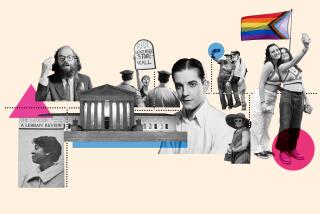Ellen’s Gay, but Is Her Announcement Worth the Weight?
The suspense mounts as we move toward the April 30 “coming out” of TV’s Ellen Morgan.
Psst, she’s a lesbian, you know.
Ellen Morgan is the lead character in the sitcom “Ellen,” starring (and I hope this isn’t confusing you) Ellen DeGeneres.
Who, by the way, is also a lesbian.
If all this has just been too much for you to take, now you know how Chrysler and JCPenney’s feel--two sponsors who have said they will pull their ads from the ABC show in protest over . . . what exactly would they be protesting?
I wish my reaction to Ellenmania, which is, “who cares?” were the prevailing one. In a week when America has reflected on the 50th anniversary of Jackie Robinson breaking the color line in major league baseball, something seems missing in the Ellen matter, notwithstanding that she appeared on the cover of Time magazine with the caption, “Yep, I’m Gay.”
A sense of gravitas, perhaps?
DeGeneres has been a bit too cutesy for my tastes, telling an interviewer recently that she had a big announcement to make about her TV character: Yes, she said, Ellen Morgan is “Lebanese.” And then, as an afterthought, DeGeneres quipped, “You know, more than half of Hollywood is Lebanese.”
How can you muster any passion for the two Ellens when DeGeneres herself has cracked jokes about the situation? Nor has DeGeneres been living a tormented life in the closet; it was well-known in comedy circles that she was gay, and she made no effort to conceal it. She was only closeted to her TV-watching public.
She also has said she didn’t divulge her orientation before, partly because it might have jeopardized her career. She also “outed” Ellen Morgan, she told Time magazine, “because I thought it was a great thing for the show, which desperately needed a point of view.”
OK, so Ellen DeGeneres isn’t Jackie Robinson.
She doesn’t claim to be and doesn’t need to be. If America has a problem with either Ellen, it’s America’s problem, not theirs.
Still, gay activists are elevating the impending episode of “Ellen” to historic, if not heroic, status. Although we already have a national “Coming Out Day” in October, gay leaders are hoping that other closeted gays and lesbians also will declare themselves on April 30, the day the “Ellen” episode airs.
“We’ve dubbed it ‘Come Out With Ellen’ day,” says Alan Klein, national communications director for the Gay & Lesbian Alliance Against Defamation. “We’re sponsoring parties in six cities and beyond that, we’re helping fans of the show and those interested in helping celebrate this day to organize 1,500 ‘Come Out With Ellen’ home-viewing parties in all 50 states.”
Interestingly, I think, Klein agrees that Ellen Morgan’s announcement may be more significant than Ellen DeGeneres’.
“As a media watchdog organization, we’re concerned about the representation of gays and lesbians on TV,” Klein says. “What we’re hoping for is that it [openly gay characters on TV] is sort of normalized. We want to see TV reflect reality. We know gay and lesbians as part of America’s rich and diverse culture, and we want to see it reflected on the TV screen. And without the fuss. Without the muss. We want it to be normalized, so we can be sure these characters are accurate and realistic, and not stereotypes, and really do represent the wide array of gay and lesbian people in the community.”
Perhaps I balk at dispensing hero status to the two Ellens, knowing about other people’s more private and pained struggles with sexual orientation. While doing a story once on a gay man who told me with great poignancy how his parents reacted to his homosexuality, I decided to employ a little Strasberg School of Method Reporting to get a sense of what it might be like.
I phoned my mother and, to preempt her having a heart attack, told her I was conducting an experiment. Would it matter, I said, if I were gay.
Dead silence.
“Yes, it would matter,” she said.
But wouldn’t I still be the same great guy I was the day before? I said.
Yes, she said, but it would still matter. I could tell she meant she wouldn’t disown me or condemn me, but yes, something would be different. The conversation ended somewhat awkwardly, and we hung up.
A minute later, she called back and said, “Is there something you’re trying to tell me?”
No, I said, it was just an experiment.
At that moment, though, I got a fuller understanding of what millions of people have gone through. And I suppose that’s why Alan Klein insists on making hay from the two Ellens.
“This is obviously a big deal to the gay and lesbian community, in that this is a historic event,” he says. “This is the first lesbian lead character in an American TV program, so there’s the celebrity side of it and also the serious side, in that this may prompt or help gays and lesbians, young and old, who struggle with the closet to close the closet door behind them and come out once and for all.”
Dana Parsons’ column appears Wednesday, Friday and Sunday. Readers may reach Parsons by writing to him at The Times Orange County Edition, 1375 Sunflower Ave., Costa Mesa, CA 92626, or calling (714) 966-7821.
More to Read
The complete guide to home viewing
Get Screen Gab for everything about the TV shows and streaming movies everyone’s talking about.
You may occasionally receive promotional content from the Los Angeles Times.






